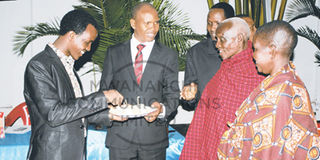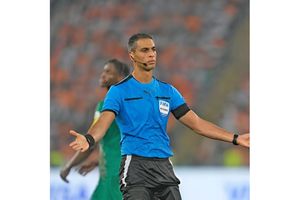Village boy who defied the odds

Mr Mokia Mollel (left) with his parents and other relatives cuts a celebration cake after earning a First Class degree from the University of Dar es Salaam recently.
PHOTO|ZEPHANIA UBWANI
What you need to know:
- His nomadic parents were not comfortable sending their firstborn son to school and would prefer him taking care of the family livestock.
Arusha. Here is somebody who had a rough time getting into the four walls of a classroom right from the beginning.
His nomadic parents were not comfortable sending their firstborn son to school and would prefer him taking care of the family livestock.
Even when he forced his way to the nearest learning centre, the facility merely the shade of a thorn tree.
The only teacher they had stayed some 12 kilometres away from village and was not paid any salary but pails of maize and beans or litres of milk.
The young man had guts to pursue education at any costs, but the enthusiasm he had was equally met with the growing number of bottlenecks.
If it is not the shortage of teachers, then it is lack of money to buy the basic necessities for a student.
Natural calamilities had their share in his early day woes. Prolonged droughts would affect his studies at school and the livelihood of his parents at home.
Yet today, Mokia Mollel (26) must feel proud as William the Conqueror, the first Norman King of England, who struggled for long to establish his power.
He overcame all the challenges to earn a first class degree upon completion of his undergraduate studies at the University of Dar es Salaam (UDSM) this year.
And for that he has been retained by the oldest higher institution of learning to pursue post-graduate studies in the hope of becoming a lecturer there.
“I am gratified for this feat”, he told The Citizen, making it clear that his achievement was a wake up call on the need to assist the pastoralist communities whose children have difficulties accessing education.
He argued the government should find ways to improve education for such communities by making boarding schools mandatory in areas they inhabit.
“Education for my people not only need the push of the government but the non-governmental organizations (NGOs)”, he said; adding: “Many of the children from our Maasai community end up in primary schools because of the low quality of the teaching in such schools”.
Despite excelling in his undergraduate studies, Mollel has a long way to go in climbing the academic ladder that would guarantee him to serve as an academic staff at UDSM.
He said in the long run he would consider establishing an NGO that would be different from an array of civil society bodies now operating amongst the pastoralist communities, mainly advocating for the rights of the livestock keepers.
What he considers is to set up a body that would support the nomadic herders overcome communicable diseases such as tuberculosis, typhoid,, HIV/Aids,brucellois and a range of diseases that are associated with poor living conditions in the pastoral lands.
The ‘dream’ may take some time to be accomplished as he has to settle down for intensive post-graduate studies but he is already concerned by the impact of climate change among members of the Maasai community in Simanjiro district, Manyara region.
“I wish the government and other organizations to put more effort in the rural areas. Look at the pastoralists. In the past, Maasais were considered rich in many aspects. This is not the case now”, he said.
He proposes what he described as Education Renaissance among the traditional livestock keepers which would not only be confined to mainstream education.
Rennaisance in Education should go further by identifying different types of talents among the remote villagers including sportsment and women in javelin, judo, archery and others which the pastoralists had been good at and which can win the country medals in international competitions.
He recalls the difficulties he was subjected to in accessing education, saying that it was only after being admitted at UDSM in 2013 to study Geography and Environmental Studies that his woes were reduced to a large extent. He encountered many difficulties in his primary and secondary education and at one time he was convinced by a friend to leave High School and travel to Nairobi to pursue other things given the unending bottlenecks.
Mokia or Baraka Mollel was born on May 1, 1990 at Nadonjukin Village in Simanjiro District, the fith born but the first boy in the family of Mzee Naputu Kunyae Mollel and Mama Nemburis Naputu. His father had 18 kids from three wives.
At the age of eight, that was in 1998, he was enrolled at a primary school what was being established in the village.
At least 80 pupils were enrolled for Standard One at the school but for one year tyhe pupils were reading under a tree.
“For one year and had only one teacher, stayed at Terrat village which is 12 km away from Nadonjukin”, he said.
However, he was forced to quit in November 1998 due to poor renumerations and that signalled the end of the ‘bush’ school at least for one year.
In early 2000, the school was revived or its establishment formalized, this time after construction of two classrooms by the parents.However, due to shortage of basic necessities, many parents in the area took their kids to fairly equipped schools far away. “I stayed in the same school until 2006 when I passed my Standard VII national examination and selected to join Simanjiro Secondary School from 2007. The situation was even worse there than in the primary school.
It was there that he started to take up responsibilities as a head prefect to address the challenges the school located at Orkesumet, the headquarters of Simanjiro district faced.
“There was a critical shortage of water and teachers”, he said, noting that for two consecutive years the basic science subjects, being physics, biology and chemistry were not taught at the institution.
When he finally passed his Form IV National Examination in 2011, he stepped on another hurdle.
His father told him blank he could no longer support him because he had no means to finance his education. While at high school, futile attempts were made to have him married right at the village.
But he was much encouraged by his excellent performance at the high school at Kongwa Secondary School in Dodoma.”I was the best English student from Standard three to Form six”, he said.




